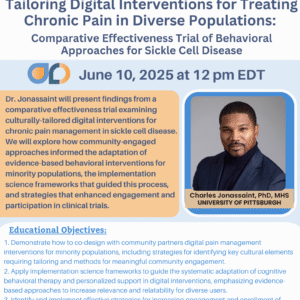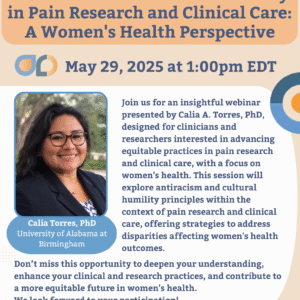Assessing Decision-Making Capacity in Older Adults: Conceptual and Practical Foundational Elements
$50.00
Presenters: Drs. Patricia Bamonti and Jessica Strong
Patricia M. Bamonti, PhD, ABPP, is a staff psychologist in the Geriatric Mental Health Outpatient clinic and Track Coordinator of the Geropsychology Training Program at VA Boston Healthcare System. She provides individual and group psychotherapy and serves as a major supervisor within the Geropsychology training program. She earned her doctorate from West Virginia University and completed pre and postdoctoral training at the Milwaukee VAMC. She holds an academic appointment as Instructor of Psychology within the Department of Psychiatry at Harvard Medical School and serves as Secretary on the board of the Council of Professional Geropsychology Training Programs and the Society of Clinical Geropsychology. Dr. Bamonti’s research and clinical interests include adjustment to chronic illness and disability and she conducts research in the New England Geriatric Research Education and Clinical Center.
Jessica Strong, PhD, ABPP, is an Assistant Professor of Psychology at the University of Prince Edward Island, in Charlottetown, PE, Canada. She supervises doctoral psychology students in clinical geropsychology competencies and organizes the clinical dissertation process for students in the PsyD program. She earned her doctoral degree from the University of Louisville and completed pre- and post-doctoral training at the VA Boston Healthcare System, affiliated with Harvard Medical School. She completed an additional Advanced Fellowship in Geriatrics with the New England Geriatric Research Education and Clinical Center. She serves as an Assistant Editor for Aging and Mental Health for the Americas. Dr. Strong’s research interests are in late life cognitive functioning, musical training, and ageism and the geropsychology workforce pipeline.
Overview:
With the rapid population growth of adults reaching 65 years of age or older, there is increasing demand for clinicians working with older adults to have at least beginner knowledge of capacity evaluations. Capacity evaluations aim to the answer the question of functioning in specific domains such as medical consent, independent living, and financial, among others (see Moye, Marson, & Edelstein, 2013 for review). These types of evaluation arise when a stakeholder (e.g., healthcare provider, family members, caregiver) questions the individual’s safety and welfare in a given domain. In older adults, capacity evaluations are most commonly requested in the context of major neurocognitive disorder. However, capacity evaluations may also be requested due to mental health conditions (e.g., psychosis), addiction (e.g., ongoing alcohol use disorder), and not uncommonly, an intersection of many underlying medical and mental health conditions (e.g., mild cognitive impairment and ongoing alcohol use disorder). This CE presentation targets licensed and unlicensed psychologists who provide clinical care to older adults or anticipate working with older adults and seek to gain a better understanding of capacity assessment in adults 65 years of age and older. This beginner’s level webinar, will provide an overview of when capacity evaluations are indicated and summarize the functional elements underlying medical consent, independent living, and financial capacity. We will review at least one standardized tool for assessing capacity and provide a basic introduction to cognitive testing in the context of capacity evaluations. Participants will learn the details of obtaining informed consent for these types of evaluations. We will end with review of practical recommendations stemming from the capacity determination.
Learning Objectives:
- By the end of this presentation, attendees will be able to describe the functional elements of capacity assessment in the domains of medical, independent, and financial decision-making.
- By the end of this presentation, attendees will be able to name one valid assessment instrument for assessing capacity in older adults.
- By the end of this presentation, attendees will be able to name cognitive domains that underpin functional elements of capacity and name at least one cognitive test to include in assessment batteries.
CE Credits Available: 1.0
Attendees must attend the entirety of the program and complete the Evaluation sent after the program. Evaluations will be sent via email shortly after the Live webinar. CE Certificates will be processed and emailed within 5 – 10 business days from Live Webinar.
Description
Co-Sponsored with Society of Clinical Geropsychology
Presenters: Drs. Patricia Bamonti and Jessica Strong
Patricia M. Bamonti, PhD, ABPP, is a staff psychologist in the Geriatric Mental Health Outpatient clinic and Track Coordinator of the Geropsychology Training Program at VA Boston Healthcare System. She provides individual and group psychotherapy and serves as a major supervisor within the Geropsychology training program. She earned her doctorate from West Virginia University and completed pre and postdoctoral training at the Milwaukee VAMC. She holds an academic appointment as Instructor of Psychology within the Department of Psychiatry at Harvard Medical School and serves as Secretary on the board of the Council of Professional Geropsychology Training Programs and the Society of Clinical Geropsychology. Dr. Bamonti’s research and clinical interests include adjustment to chronic illness and disability and she conducts research in the New England Geriatric Research Education and Clinical Center.
Jessica Strong, PhD, ABPP, is an Assistant Professor of Psychology at the University of Prince Edward Island, in Charlottetown, PE, Canada. She supervises doctoral psychology students in clinical geropsychology competencies and organizes the clinical dissertation process for students in the PsyD program. She earned her doctoral degree from the University of Louisville and completed pre- and post-doctoral training at the VA Boston Healthcare System, affiliated with Harvard Medical School. She completed an additional Advanced Fellowship in Geriatrics with the New England Geriatric Research Education and Clinical Center. She serves as an Assistant Editor for Aging and Mental Health for the Americas. Dr. Strong’s research interests are in late life cognitive functioning, musical training, and ageism and the geropsychology workforce pipeline.
Overview:
With the rapid population growth of adults reaching 65 years of age or older, there is increasing demand for clinicians working with older adults to have at least beginner knowledge of capacity evaluations. Capacity evaluations aim to the answer the question of functioning in specific domains such as medical consent, independent living, and financial, among others (see Moye, Marson, & Edelstein, 2013 for review). These types of evaluation arise when a stakeholder (e.g., healthcare provider, family members, caregiver) questions the individual’s safety and welfare in a given domain. In older adults, capacity evaluations are most commonly requested in the context of major neurocognitive disorder. However, capacity evaluations may also be requested due to mental health conditions (e.g., psychosis), addiction (e.g., ongoing alcohol use disorder), and not uncommonly, an intersection of many underlying medical and mental health conditions (e.g., mild cognitive impairment and ongoing alcohol use disorder). This CE presentation targets licensed and unlicensed psychologists who provide clinical care to older adults or anticipate working with older adults and seek to gain a better understanding of capacity assessment in adults 65 years of age and older. This beginner’s level webinar, will provide an overview of when capacity evaluations are indicated and summarize the functional elements underlying medical consent, independent living, and financial capacity. We will review at least one standardized tool for assessing capacity and provide a basic introduction to cognitive testing in the context of capacity evaluations. Participants will learn the details of obtaining informed consent for these types of evaluations. We will end with review of practical recommendations stemming from the capacity determination.
Learning Objectives:
- By the end of this presentation, attendees will be able to describe the functional elements of capacity assessment in the domains of medical, independent, and financial decision-making.
- By the end of this presentation, attendees will be able to name one valid assessment instrument for assessing capacity in older adults.
- By the end of this presentation, attendees will be able to name cognitive domains that underpin functional elements of capacity and name at least one cognitive test to include in assessment batteries.
CE Credits Available: 1.0
Attendees must attend the entirety of the program and complete the Evaluation sent after the program. Evaluations will be sent via email shortly after the Live webinar. CE Certificates will be processed and emailed within 5 – 10 business days from Live Webinar.





Reviews
There are no reviews yet.